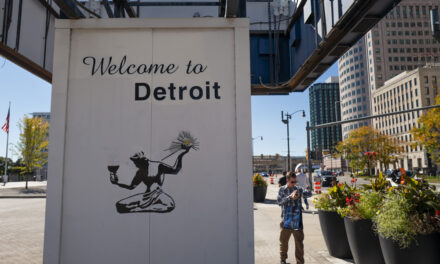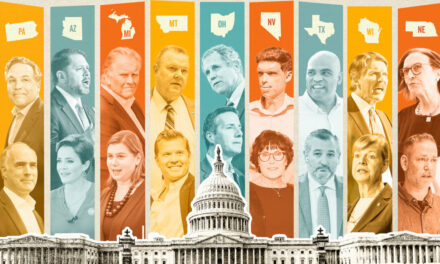We support our Publishers and Content Creators. You can view this story on their website by CLICKING HERE.
The projected president-elect has plans for illegal immigration, taxes, regulations, and tariffs.
Projected President-elect Donald Trump has made a number of sweeping proposals for a second term in office, outlining a wide-ranging agenda that targets federal regulations, taxes, immigration, and social issues.
As of Wednesday morning, The Associated Press projected that Trump is the winner of the election after securing enough electoral votes over his opponent Vice President Kamala Harris.
Early Wednesday, the former president and president-elect claimed victory in the 2024 presidential contest, telling supporters that voters had given him an “unprecedented and powerful mandate.” Early projections show that Trump may win not only the Electoral College but also the popular vote, something he’s never done in his previous two campaigns.
Immigration
Since 2015, Trump has made curbing illegal immigration a cornerstone of his campaigns. As president, he built or reconstructed about 400 miles of border barrier along the U.S.–Mexico border and implemented a number of rules curbing illegal migration into the country.
During the campaign, Trump often said that he would initiate the largest “mass deportation” effort in U.S. history if elected. Recently, he also warned Mexico that he would impose a 25 percent tariff targeting the country if it fails to curb illegal immigration and that he would raise that tariff if Mexico doesn’t comply.
Also, he’s suggested more enhanced screenings for immigrants, ending birthright citizenship—which may require a constitutional amendment—and reimposing certain policies enacted during his first term such as the “remain in Mexico” protocol.
Tom Homan, a former acting director of U.S. Immigration and Customs Enforcement (ICE) who is expected to join the new administration, told media outlets last year that the scale of deportations depends on what resources are available.
Vice President-elect JD Vance said in his debate with Minnesota Gov. Tim Walz on Oct. 1 that deporting criminals would be a second Trump administration’s initial focus.
“You’ve got to reimplement Donald Trump’s border policies, build the wall, reimplement deportations,” Vance said, adding that the United States has 20 to 25 million illegal immigrants in the country.
“What do we do with them? I think the first thing that we do is we start with the criminal migrants.”
Taxes and Regulations
Throughout the 2024 campaign, Trump has promised to curb federal regulations that he said would limit the creation of new U.S. jobs. He also has pledged to keep intact a 2017 tax cut that he supported and signed while in office.
His team has also proposed a further round of individual and corporate tax cuts beyond those initiated in his first term.
Trump has pledged to reduce the corporate tax rate from 21 percent to 15 percent for companies that make their products in the United States. In a bid to win Nevada, Trump earlier this year pledged to end the taxation of tips and overtime wages to aid some service workers and waiters.
He has pledged not to tax or cut Social Security benefits. Trump also has said that as president, he would pressure the Federal Reserve to lower interest rates but wouldn’t make any demands on the central bank.
Some of his proposals would require congressional action. As of Wednesday morning, the GOP is projected to retake the Senate, but the picture around the House is murkier.
Tariffs
In multiple campaign stops this year, Trump floated the idea of a 10 percent or more tariff on all goods imported into the United States, which he said would eliminate the country’s trade deficit.
He has also said he should have the authority to set higher tariffs on countries that have put tariffs on U.S. imports. He has threatened to impose a 200 percent tariff on some imported cars, saying he is determined in particular to keep cars from Mexico from coming into the country.
Trump has targeted China in particular. He proposes phasing out Chinese imports of goods such as electronics, steel, and pharmaceuticals over four years. He seeks to prohibit Chinese companies from owning U.S. real estate and infrastructure in the energy and tech sectors.
“To me, the most beautiful word in the dictionary is ‘tariffs,’” Trump said in an interview with John Micklethwait, editor-in-chief of Bloomberg News, in October. “It’s my favorite word.”
He added at the time, “You see these empty, old, beautiful steel mills and factories that are empty and falling down,” referring to facilities that used to make goods in the United States.
“We’re going to bring the companies back. We’re going to lower taxes for companies that are going to make their products in the USA. And we’re going to protect those companies with strong tariffs,” Trump said.
More Drilling
The former president said that he wants to cut federal regulations on drilling for oil and natural gas, a move that he says would lower energy costs and inflation. In multiple instances, Trump said he would reauthorize drilling in the Arctic National Wildlife Refuge in Alaska, which was suspended under the Biden administration.
Meanwhile, he would pull the United States out of the Paris Climate Accords, a worldwide plan that claims to reduce carbon emissions. Trump also said he would roll back some federal policies around electric vehicles.
In his campaign, Trump has often said that gas prices were much lower under his administration than they have been under the Biden administration. He has suggested that prices would again fall when he takes office.
“When I left office … gasoline had reached $1.87 a gallon. We actually had many months where it was lower than that,” Trump told reporters over the summer. “But we hit $1.87, which was a perfect place, an absolutely beautiful number.”
Social Policies
Trump has pledged to require U.S. colleges and universities to “defend American tradition and Western civilization” and to purge them of diversity and inclusion programs, which he and Republicans have said are leftist in nature.
He said he would direct the Justice Department to pursue civil rights cases against schools that engage in racial discrimination. At K–12 schools, Trump would support programs allowing parents to use public funds for private or religious instruction. Trump also wants to abolish the federal Department of Education and leave states in control of schooling.
Regarding abortion, Trump has said that a federal ban on abortion is not needed and that the issue should be resolved by states. He’s also said he backs rules that advance in vitro fertilization, birth control, and prenatal care.
“It’s a man playing in the game,” Trump said at an October town hall event. “Look at what’s happened in swimming. Look at the records that are being broken.”
Reuters contributed to this report.

 Conservative
Conservative  Search
Search Trending
Trending Current News
Current News 







